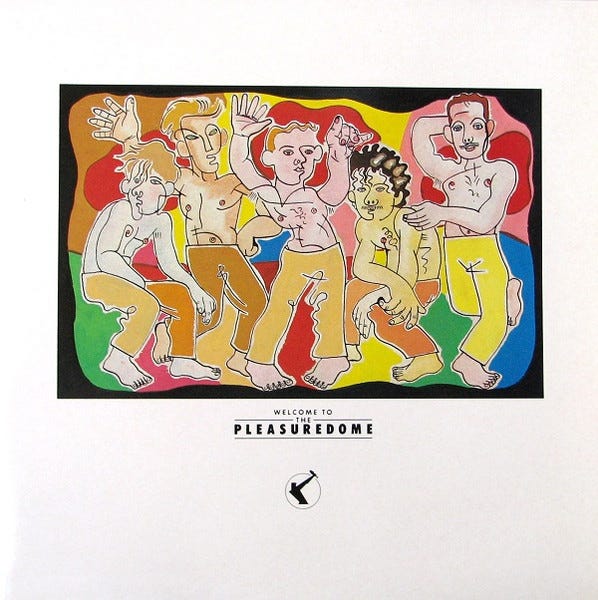Frankie Goes to Hollywood: Welcome to the Pleasuredome, 1984
What does over the top *of* over the top sound like?
When Frankie Goes to Hollywood’s Welcome to the Pleasuredome was released, in the autumn of 1984, I don’t think anyone had ever heard anything quite like it. “Relax,” their first single, was a fairly tight pop record; its follow-up, “Two Tribes,” was definitely more sprawling but yet, still — I’m not sure anything could’ve prepared listeners for the likes of Pleasuredome’s 13:40 title track, or the semi-outrageous “Krisco Kisses.” (Weren’t sure their front men were gay? Well then…)
I was about to turn 14 when this album came out, and suffice it to say it blew my early-teenaged mind, hardcore. Not only because of its sexual content — especially significant for a gay, rural midwestern, 13-year-old — but because of the way it sounded. The only album I’d heard prior to this which might’ve prepared me, even slightly, was ABC’s 1982 debut The Lexicon of Love, another ace pop record swathed in can-you-believe-it production. And what do you know, both records were produced by the same man, one Trevor Horn.
Over the years, I’ve come to realize that part of what contributes to the extreme over-the-topness of Pleasuredome, via Horn, is how prog the damn thing is. Which may seem like an odd observation on its surface, but remember that Horn came from Yes (prog-pop kings, nay overlords) and the Buggles (who definitely have some prog in their DNA). The album’s title track is practically a prog-rock fantasia, moving through movements as lead singer Holly Johnson does backflips. And their third UK #1, “The Power of Love” (which topped the chart just prior to the release of Band Aid’s “Do They Know It’s Christmas,” thus depriving them of the UK Christmas #1 but still making them the first band to open their career with a trio of #1s since Gerry & the Pacemakers some 20 years beforehand) could, without much alteration, be an Emerson, Lake, & Palmer ballad!
In constructing Welcome to the Pleasuredome — and as he reportedly played much of the material himself, leaving the Frankie band members out of the process, I’d definitely call Horn’s hand in the album more construction than “mere” production — Horn’s ethos seems to have been, “When in doubt, MORE.” Take the female singers on “Pleasuredome” — hell, take the entire song as Exhibit A. It builds and builds and builds, albeit to almost no end: when the song ends, it just kind of slithers out of frame, with Johnson intoning “the world is my oyster” repeatedly, until his pitch-altered voice yells “WELCOME!”
Then there’s the one song from the album that the world recognizes. “Relax” hit the top 10 in an astounding 22 countries, from the UK to Thailand, from Iceland to Israel, from Switzerland to, even, the U.S. (where a re-release got to #10 in March of 1985). In a full half of those 22 countries, “Relax” topped the chart. It was a monumentally popular record, like Adele-level popular. And it was a song about ejaculation. Sung by an openly gay man. In 1984. (And Holly Johnson can claim the lyric is “When you wanna suck it, chew it” all he wants, but I don’t believe him for a moment.) And on top of that, Horn piles more and more on top of it, until it ends in a massive orgasm. (Really. Listen to it again.)
“Two Tribes,” a towering, genius, anti-war record and the follow-up single to “Relax” — #1 in seven countries, including an astounding nine weeks in the UK, but a disappointing-not-surprising #43 flop in the U.S. — sounds like the biggest record you’ve ever heard, and I mean that in square miles. It’s huge. And that’s to say nothing of the 9-minute “Annihilation Mix” on the 12”, which opens with air-raid sirens and just gets -- in the era of peak Cold War hysteria -- more frightening from there. I was legitimately freaked out by the single versions of “Two Tribes,” and that speaks volumes as to the vision Frankie had for the record (co-written by band members Johnson, drummer Peter Gill, and bassist Mark O’Toole) and for the way Horn made it come to terrifying life.
I’ve not even mentioned yet that FGTH made their debut a double album with a running time of 64 minutes. In its original form, it featured a quartet of covers, of Edwin Starr’s “War,” Gerry & the Pacemakers’ “Ferry Cross the Mersey,” Bruce Springsteen’s “Born to Run,” and the Bacharach/David composition “Do You Know the Way to San Jose,” most famously recorded by Dionne Warwick. And then there was their use of Spitting Image’s Chris Barrie as the voice of both HRH Prince Charles (on a very naughty spoken-word interlude), and U.S. President Ronald Reagan. I mean, who does that kind of thing?
Frankie Goes to Hollywood, that’s who, and God bless them for it.
WELCOME!
[Originally written for Rock and Roll Globe in 2019.]



